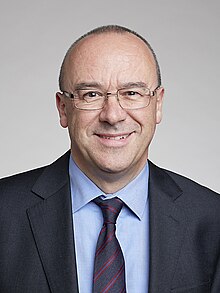Christopher Bishop
Christopher Bishop | |
|---|---|
 Bishop in 2017 | |
| Born | 7 April 1959 Norwich, England |
| Education | Earlham School |
| Alma mater | |
| Known for | Pattern Recognition and Machine Learning (PRML) book |
| Spouse |
Jennifer Morris (m. 1988) |
| Children | 2 |
| Awards |
|
| Scientific career | |
| Fields | Machine learning[2] |
| Institutions | |
| Thesis | The semi-classical technique in field theory: some applications (1983) |
| Doctoral advisor | |
| Doctoral students | |
| Website | www |
Christopher Michael Bishop (born 7 April 1959) FRS FRSE FREng[7] is a British computer scientist. He is a Microsoft Technical Fellow and Director of Microsoft Research AI4Science. He is also Honorary Professor of Computer Science at the University of Edinburgh, and a Fellow of Darwin College, Cambridge. Chris was a founding member of the UK AI Council, and in 2019 he was appointed to the Prime Minister’s Council for Science and Technology.
Early life and education
Christopher Michael Bishop was born on 7 April 1959 in Norwich, England, to Leonard and Joyce Bishop.[8] He was educated at Earlham School in Norwich, and obtained a Bachelor of Arts degree in physics from St Catherine's College, Oxford, and later a PhD in theoretical physics from the University of Edinburgh,[8] with a thesis on quantum field theory supervised by David Wallace and Peter Higgs.[3][4]
Research and career
Bishop investigates machine learning,[7] in which computers are made to learn from data and experience.[9][10][11] His former doctoral students include Neil Lawrence[5][6] and Danielle Belgrave.
Publications
Bishop is the author of two highly cited and widely adopted machine learning text books: Neural Networks for Pattern Recognition[12] and Pattern Recognition and Machine Learning.[13]
Awards and honours
Bishop was awarded the Tam Dalyell prize in 2009[14] and the Rooke Medal from the Royal Academy of Engineering in 2011.[15] He gave the Royal Institution Christmas Lectures in 2008[1] and the Turing Lecture in 2010. Bishop was elected a Fellow of the Royal Academy of Engineering (FREng) in 2004,[16] a Fellow of the Royal Society of Edinburgh (FRSE) in 2007,[17] and Fellow of the Royal Society (FRS) in 2017.[7]
Personal life
Bishop married Jennifer Mary Morris in 1988. They have two sons.[8]
References
- ^ a b 2008 Royal Institution Christmas Lectures
- ^ Christopher Bishop publications indexed by Google Scholar
- ^ a b "Professor Christopher Bishop elected Fellow of the Royal Society of Edinburgh". University of Edinburgh School of Informatics. Retrieved 8 September 2020.
- ^ a b Bishop, Christopher Michael (1983). The semi-classical technique in field theory : some applications (PhD thesis). University of Edinburgh. hdl:1842/11984. OCLC 59284998. EThOS uk.bl.ethos.346542.

- ^ a b Christopher Bishop at the Mathematics Genealogy Project
- ^ a b Lawrence, Neil David (2000). Variational Inference in Probabilistic Models (PDF). thelawrences.net (PhD thesis). University of Cambridge. OCLC 894596569. EThOS uk.bl.ethos.621104. Archived from the original (PDF) on 18 April 2003.

- ^ a b c Anon (2017). "Christopher Bishop". royalsociety.org. London: Royal Society.
- ^ a b c "Bishop, Prof. Christopher Michael". Who's Who. A & C Black. 2021. doi:10.1093/ww/9780199540884.013.U249776. (Subscription or UK public library membership required.)
- ^ "Microsoft Research Cambridge". Microsoft.
- ^ Bishop, Christopher Michael (1995). Neural Networks for Pattern Recognition. Oxford University Press. ISBN 9780198538646.
- ^ Tipping, Michael E.; Bishop, Christopher M. (1999). "Probabilistic Principal Component Analysis". Journal of the Royal Statistical Society, Series B. 61 (3): 611–622. CiteSeerX 10.1.1.35.2022. doi:10.1111/1467-9868.00196. ISSN 1369-7412. S2CID 15538672.
- ^ Neural Networks for Pattern Recognition (1995) [ISBN missing]
- ^ Pattern Recognition and Machine Learning https://www.microsoft.com/en-us/research/people/cmbishop/prml-book/ (2006) [ISBN missing]
- ^ Tam Dalyell Prize
- ^ "Royal Academy of Engineering, Rooke Medal". Archived from the original on 14 September 2021. Retrieved 1 September 2015.
- ^ "Royal Academy of Engineering". Archived from the original on 14 September 2021. Retrieved 1 February 2018.
- ^ "Professor Christopher M Bishop FREng FRSE, FRS - The Royal Society of Edinburgh". The Royal Society of Edinburgh. Retrieved 1 February 2018.
- 1959 births
- Living people
- British physicists
- British computer scientists
- Computer science educators
- Alumni of St Catherine's College, Oxford
- Alumni of the University of Edinburgh
- Academics of the University of Edinburgh
- Academics of Aston University
- Fellows of the British Computer Society
- Fellows of Darwin College, Cambridge
- Fellows of the Royal Academy of Engineering
- Fellows of the Royal Society of Edinburgh
- Fellows of the Royal Society
- Microsoft employees
- Microsoft Research people
- Computer science writers
- People from Norwich
